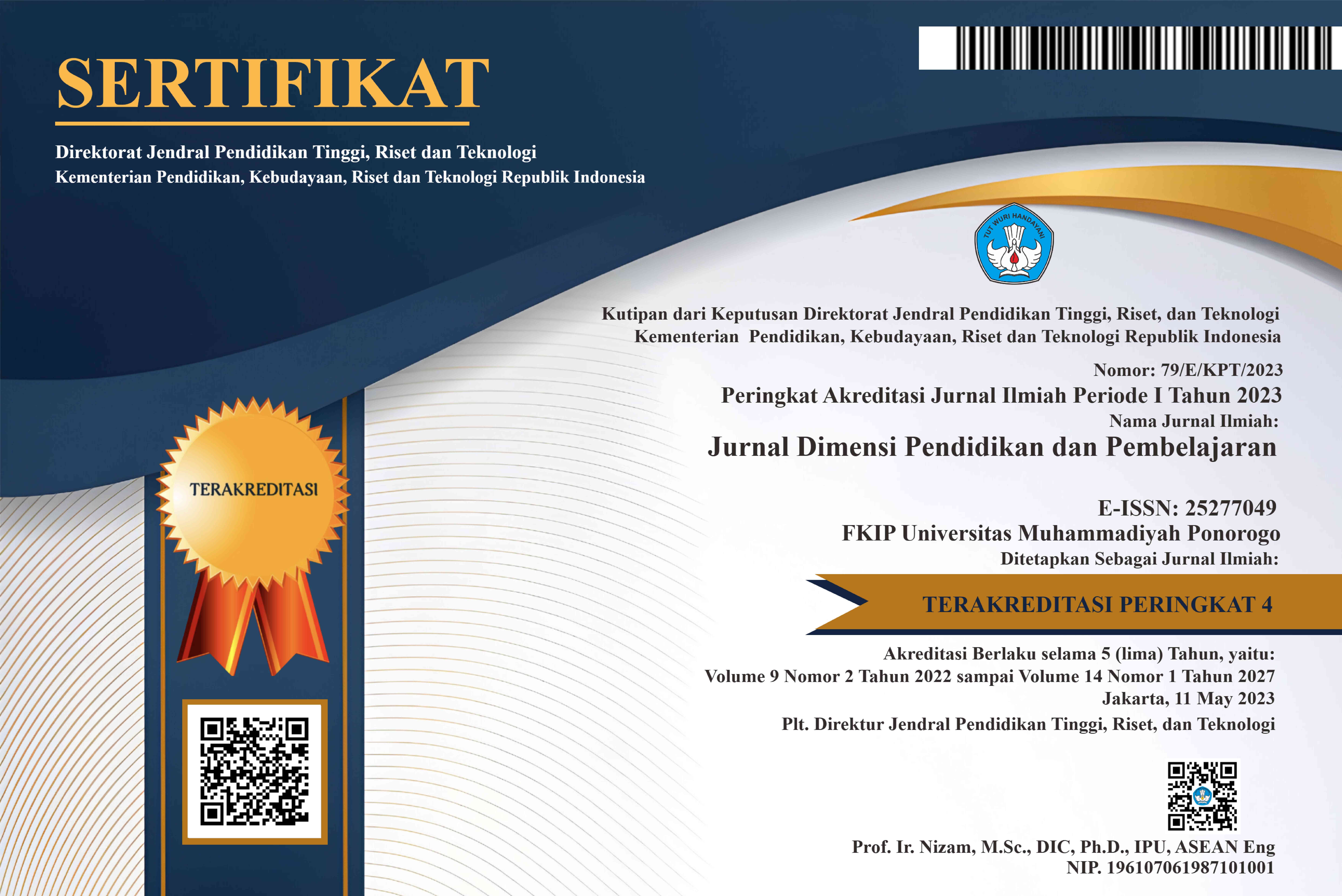Kesulitan dan Strategi Mahasiswa Pendidikan Bahasa Inggris Dalam Extensive Reading
DOI:
https://doi.org/10.24269/dpp.v9i2.4032Abstract Penelitian ini bertujuan untuk mengidentifikasi kesulitan-kesulitan dan strategi mengatasinya dalam extensive reading mahasiswa program studi pendidikan bahasa Inggris universitas Muhammadiyah ponororgo. Extensive reading merupakan pendekatan dalam pembelajaran ketrampilan membaca yang dibedakan dengan intensive reading. Dalam extensive reading mahasiswa diberi kebebasan dalam memilih materi bacaan sesuai dengan ketertarikan dan kemampuan baca mereka. Namun demikian dalam implementasinya tidak semua mahasiswa dapat melakukannya dengan lancar. Bagi mahasiswa dengan tipe “strong reader†biasanya berusaha keras untuk mengatasi kesulitan-kesulitan yang dihadapi. Hasil investigasi menunjukkan bahwa mereka menghadapi kesulitan yang berasal dari teks bacaan dan juga kesulitan di luar teks bacaan dan mereka mengatasinya dengan berbagai macam strategi
References
Arai, Yuya. 2019. Extensive Reading Definitions, Effectiveness, And Issues Concerning Practice In The EFL Classroom: Japanese Teacher Trainees’ Perceptions Journal of Extensive Reading 2019 Volume 7 ISSN: 2187-5065
Creswell, John.W. 2014. Research Design: Quantative, Qualitative, and Mixed Method Approaches. Singapore: Sage Publication Inc.
Day, R. and Bamford, J. (2002). Top ten principles for teaching extensive reading. Reading in a Foreign Language, 14(2).
Day, R., Prentice, N. et al. (2016). Extensive Reading, revised edition – Into the Classroom. Oxford University Press
Bell,Timothy. 1998. Extensive Reading: Why? and How? The Internet TESL Journal, Vol. IV, No. 12, December 1998
Brown, H. Douglas. 2004. Principles of Language Learning and Teaching. USA: Prentice-Hall Inc.
Indriastuti, Niken Reti. 2017. Investigasi Reading Strategi Mahasiswa Prodi Bahasa Inggris UMPO. Prosiding Seminar Nasional FE UMPO.
…………………………2019. Internet Sebagai Sumber Belajar Reading Mahasiswa Bahasa Inggris UMPO. Prosiding Seminar Nasional Pendidikan UMPO 2019.
Javed, Muhammed. The Journal of Asia TEFL Vol.13, No.3, Fall 2016, 204-220. Identifying Reading Strategies to Teach Literal, Reorganisation and Inferential Comprehension Questions to ESL Students
Mami, Yoshida.2018. Are Individual Attention and Modeling More Effective than Whipping?:Longitudinal Case Study of EngagementPatterns and Motivating Factors forUniversity Students’ Extensive Reading Proceedings of the Fourth World Congress on Extensive Reading ISSN: 2165-4239
Meng, Fanshao. 2009. Developing Students’ Reading Ability through Extensive Reading Vol. 2, No. 2 English Language Teaching June, 2009 www.ccsenet.org/journal.html
Nurhadi,Kardi and Larasaty, Gina. 2018. The Low Motivated Factors In Extensive Reading Achievement. Indonesia Research and Innovation in Language Learning Vol. 1(3) September 2018 pp. 141-152 P- ISSN: 2614-5960 e-ISSN: 2615-4137 http://jurnal.unswagati.ac.id/index.php/RILL
Creswell, John.W. 2014. Research Design: Quantative, Qualitative, and Mixed Method Approaches. Singapore: Sage Publication Inc.
Day, R. and Bamford, J. (2002). Top ten principles for teaching extensive reading. Reading in a Foreign Language, 14(2).
Day, R., Prentice, N. et al. (2016). Extensive Reading, revised edition – Into the Classroom. Oxford University Press
Bell,Timothy. 1998. Extensive Reading: Why? and How? The Internet TESL Journal, Vol. IV, No. 12, December 1998
Brown, H. Douglas. 2004. Principles of Language Learning and Teaching. USA: Prentice-Hall Inc.
Indriastuti, Niken Reti. 2017. Investigasi Reading Strategi Mahasiswa Prodi Bahasa Inggris UMPO. Prosiding Seminar Nasional FE UMPO.
…………………………2019. Internet Sebagai Sumber Belajar Reading Mahasiswa Bahasa Inggris UMPO. Prosiding Seminar Nasional Pendidikan UMPO 2019.
Javed, Muhammed. The Journal of Asia TEFL Vol.13, No.3, Fall 2016, 204-220. Identifying Reading Strategies to Teach Literal, Reorganisation and Inferential Comprehension Questions to ESL Students
Mami, Yoshida.2018. Are Individual Attention and Modeling More Effective than Whipping?:Longitudinal Case Study of EngagementPatterns and Motivating Factors forUniversity Students’ Extensive Reading Proceedings of the Fourth World Congress on Extensive Reading ISSN: 2165-4239
Meng, Fanshao. 2009. Developing Students’ Reading Ability through Extensive Reading Vol. 2, No. 2 English Language Teaching June, 2009 www.ccsenet.org/journal.html
Nurhadi,Kardi and Larasaty, Gina. 2018. The Low Motivated Factors In Extensive Reading Achievement. Indonesia Research and Innovation in Language Learning Vol. 1(3) September 2018 pp. 141-152 P- ISSN: 2614-5960 e-ISSN: 2615-4137 http://jurnal.unswagati.ac.id/index.php/RILL
Downloads
Published
2021-11-29
Issue
Section
Artikel
License
Copyright
Authors who publish their manuscripts in this journal agree to the following terms:
- The copyright on each article belongs to the author.
- The author acknowledges that Jurnal Dimensi Pendidikan dan Pembelajaran has the right to be the first to publish under a Creative Commons Attribution 4.0 International (Attribution 4.0 International CC BY 4.0) license.
- Authors may submit articles separately, arranging for the non-exclusive distribution of manuscripts that have been published in this journal to other versions (e.g., sent to the author's institutional repository, publication into books, etc.), acknowledging that the manuscript was first published in the Jurnal Dimensi Pendidikan dan Pembelajaran.
Â
License
Use of the article will be governed by the Creative Commons Attribution license as currently published under the Creative Commons Attribution 4.0 International License (Attribution 4.0 International (CC BY 4.0).
Â
This license permits anyone to copy and redistribute this material in any form or format, compose, modify, and make derivatives of this material for any purpose, including commercial purposes, as long as they give credit to the author for the original work.



_001.jpg)



